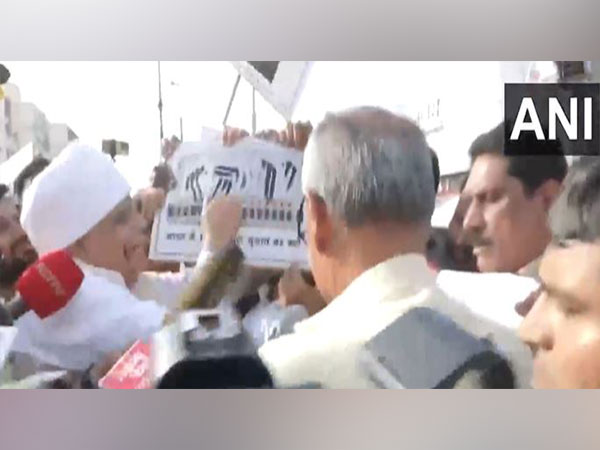Refuting the Congress general secretary Jairam Ramesh’s allegations on Voter-verified paper audit trail (VVPAT) and Electronic Voting Machine (EVM), the Election Commission of India (ECI) said that the Commission has “full faith” in the use of EVMs in the election.
The reply comes after Jairam Ramesh wrote a letter to the Election Commission seeking an appointment to meet the delegation of INDIA bloc leaders to discuss the issue of Voter-verified paper audit trail (VVPAT).
Responding to Congress leader, the ECI stands firm asserting that literature in the public domain on EVM including the latest updated FAQs (85 Questions) answers all reasonable and legitimate aspects of the use of EVMs adequately and comprehensively.
“Rule 49A and 49M of Conduct of Election Rules 1961 governing VVPAT and handling of paper slips were introduced by INC on August 14, 2013.”
“While responding to an earlier letter dated 09.08.2023, ECI earlier also on 23.08.2023 comprehensively addressed all queries and detailed material including updated FAQs, EVM Manual, Powerpoint presentation on EVM, Status paper on EVM, legal backing of the EVM ecosystem and the judicial validation through various judgments of Supreme Court and various High Courts over a credible 40 years journey of EVMs,” it said.
The Commission further said that the recent letter dated December 30, 2023, does not raise any un-responded issue on EVM/VVPAT.
“Memorandum dated August 9, 2023, has already been duly replied on August 23, 2023. Further, para wise reply to issues raised due to incorrect and inadequate appreciation of material available in the public domain in a follow-up letter dated 2nd October 2023 by Omar Hooda, in an individual capacity, is further replied by Annexure I to this letter covering all aspects of EVMs like non-tampering, non-hacking, microcontrollers, end-to-end verifiability, legal provisions, counting, technical competency, manufacturing, source code etc,” ECI responded to Congress leader.
They further stated that it is reiterated that material made available by ECI in the public domain on EVMs, including the latest updated FAQs, adequately and comprehensively covers all reasonable and legitimate aspects of the use of EVMs in the Indian election.
“The current letter dated 30th December 2023, said to be in sequence of the earlier letters, has no new assertions or reasonable and legitimate doubts which require further clarifications,” it said.
The Election body further stated that current EVMs in use in Indian elections are compliant with the extant legal framework created and strengthened by the successive Union Governments of the day and jurisprudence evolved over 40 years by the Constitutional Courts of India.
“Anything beyond existing legal framework and established jurisprudence is beyond the singular domain of the Commission,” it added.
“It is not out of place to mention Writ Petition (Civil) 6635/2021 and CM 20855/2021 in Delhi High Court and SLP (Civil) 16870/2022 filed against use of EVM/VVPATs in Indian election, wherein High Court and Supreme Court of India had not only dismissed the petitions but imposed cost of Rs 10,000/- and Rs 50,000/- respectively on the petitioner for filing publicity seeking frivolous petition,” it said.
The Commission further said that as mentioned various aspects related to VVPAT are sub judice in the Supreme Court of India in Writ Petition.
“Needless to further reiterate that political parties and candidates are associated at every stage of handling EVMs, starting from FLC, storage, movement, training, randomisation, commissioning, mock polls, start of poll, close of poll, counting etc,” it added.
The Commission further said that based on the outcomes of the elections conducted using EVMs, legal framework, established jurisprudence, technical security and administrative safeguards, the Commission has full faith in the use of EVMs in elections.
“It is beyond any explanation that out-of-context references are being made to other Countries and their Constitutional Courts about the use of EVMs in elections. Based on the outcomes of the elections conducted using EVMs (Annexure-II), legal framework, established jurisprudence, technical security and administrative safeguards, the Commission has full faith in the use of EVMs in elections,” it stated.
Earlier on January 2, Jairam Ramesh wrote a letter to the Election Commission seeking an appointment to meet the delegation of INDIA bloc leaders to discuss the issue of Voter-verified paper audit trail (VVPAT).
The letter stated, “…a request for an opportunity for a 3-4 member team of INDIA party leaders to meet with you and your colleagues and talk a few minutes to put forward our point of view on VVPATs. Surely, this is a perfectly reasonable and legitimate request.”
As stated in the letter, the INDIA parties’ delegation requested several times for a meeting to discuss Electronic Voting Machine (EVM)-related concerns through a memorandum.
Referring to ECI’s clarification of the delegation’s memorandum as ‘generic’, the letter stated, “There was no meeting or hearing provided to the INDIA Parties’ delegation despite repeated requests.”
“On October 2, 2023, a follow-up representation was sent by us through counsel. The representation raised specific concerns which remained unaddressed in the ECI’s clarification of August 23, 2023. No response was received on the same,” the letter mentioned.
The letter added that the delegation sought an appointment again on December 20, 2023, to “discuss and provide suggestions on the use of VVPATs” based on a resolution passed at the meeting of leaders of INDIA parties held on December 19, 2023.
“We have been trying to meet with the ECI to hand over a copy of this resolution and have a discussion but have not been successful so far in doing so,” the letter stated.
The fourth meeting of the Opposition’s INDIA bloc, held in Delhi on December 19, 2023, passed the resolution on Electronic Voting Machines (EVMs) and the suspension of MPs from Parliament.(ANI)
For more details visit us: https://lokmarg.com/



